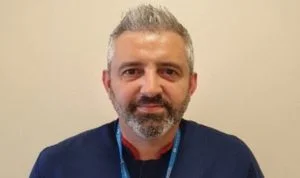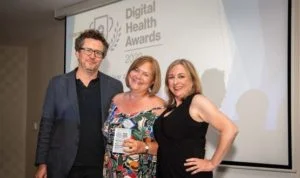 What is your current role?
What is your current role?
I am currently a district nursing clinical lead at Midlands Partnership NHS Foundation Trust and have been for the past few years.
How did you get to where you are now?
I started my NHS career as a clinical support worker some 24 years ago. I didn’t think for one second that I would become a registered nurse at that point due to having dyslexia. I was actively encouraged to apply to undertake my pre-registration course at a local university and that’s when I started to get interested in digital ways to support me through the programme. I started the course in September 2002 and have never looked back since.
How did it feel to win Rising Star in Digital Nursing?
I still can’t really believe it. I was nominated by IT colleagues at work due to a project that I had been working on. I have previously worked on several IT projects however the roll out of total mobile is by far the largest. I am not sure if winning has really sunk in at all yet. I do keep looking at the award every now and then to remind myself.
At the end of the day, I am a nurse who loves the thought of improving things for patients and staff. Using digital in my work place has really helped me both inform the patients that I work with about their health needs and also has helped staff by speeding up the documentation element of providing care in a patient’s home. The use of a tablet device enables us to use lots of digital in the hope that this will improve the outcomes for our patients.
What is the most challenging part of your role?
No day is ever the same. I am community based and therefore travel to the majority of my patients. We do run ambulatory clinic services alongside home visits, however it’s the home care that I really love. Some of the main challenges are the huge health inequalities within the areas that I cover.
I also look at all incidents raised for my area and feed back to the reporter (hopefully in a timely manner). Having enough hours in the day is another challenge, and just trying to ensure that we do the best we can as a service, ensuring the patient is truly at the heart of everything that we do.
Within your organisation, what is the most significant digital achievement of the past 12 months?
I work for a very forward thinking organisation. Midlands Partnership Foundation Trust is relatively new – it has its own digital strategy and really listens to staff to see what the needs of services are. There are currently lots of things going on within the trust. As the trust covers both physical and mental health services there has been lots of work done by IT and ward-based staff on remote monitoring of patients within inpatient settings.
The trust is currently looking at dictation software and has spent the last 12 months engaging with staff to ensure it is getting things right, working hugely on the current connectivity and performance when out and about. All community nursing staff (physical health) now have laptops, tablets and phones to use which makes life much less stressful.
Probably the most significant achievement for the trust is the rollout of total mobile in which I have been heavily involved. It has enabled community nursing to really look at the way it was working and change it for the better using digital.
What is the largest barrier to achieving digital transformation?
I think at the beginning it was connectivity, especially when out in the community. The trust covers the whole of North, South and East Staffordshire and staff like to be involved in new clinical systems, appearing to disengage if they feel that they are not being listened to.
Whenever a new system is being developed it has to be fit for purpose and do the job it is supposed to do, and ideally save clinicians time.
What do you hope to digitally achieve within your role and organisation over the next 12 months?
I have worked for the organisation for the last 14 years and will hopefully continue to engage with the clinical staff and drive forward the trust’s digital agenda to ensure that digital is truly embedded in everyday practice.
My new work stream is to start to look at the way in which we communicate with our GP colleagues and care agencies. It will of course have a digital answer, however it’s just looking to ensure it will work for all.
You can find out who scooped each award here


